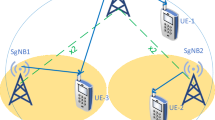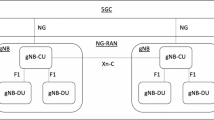Abstract
Performance evaluation of two bandwidth allocation strategies in wireless mobile integrated services networks is carried out. Performances of the proposed strategies are compared with those of the traditional guard channels and threshold strategies. In the study, a single wireless cell which is accessed by voice and non-voice traffic types producing, respectively narrowband and wideband calls is considered. In the proposed strategies a number of channels are reserved in a fixed or dynamic fashion for the use of originating wideband calls in addition to the guard channels allocated for the handoff calls. The results indicate that the two strategies have comparable advantages and by manipulating the number of reserved channels, desired performance levels can be achieved. The dynamic reservation based strategy makes the system fairer for the originating wideband calls while maintaining low handoff dropping probability and acceptable channel utilization levels. On the other hand, the fixed reservation strategy provides a lower handoff call dropping at comparable channel utilization levels. The tradeoff is between improving the handoff call dropping versus the originating wideband call blocking. Both strategies provide better performance for the originating wideband calls compared with that provided by the traditional guard channels strategy.













Similar content being viewed by others
References
Hong, D., & Rappaport, S. S. (1986). Traffic model and performance analysis for cellular mobile radio telephone systems with prioritized and non-prioritized handoff procedures. IEEE Transactions on Vehicular Technology, VT-35(3), 77–92.
Guerin, R. (1988). Queuing blocking system with two arrival streams and guard channels. IEEE Transactions on Communications, 36(2), 153–163.
Soh, W.-S., & Kim, H. S. (2001). Dynamic guard bandwidth scheme for wireless broadband networks. Proceedings of IEEE INFOCOM 2001, 1, 572–581.
Trivedi, K. S., Selvamuthu, D., & Ma, X. (2002). Analytic modeling of handoffs in wireless cellular networks. In Proceedings of 6th Joint Conference on Information Sciences (pp. 1383–1392) March 2002, Raleigh, NC.
Lee, J. Y., Bahk, S., & Kim, S. (2000). Cell-oriented admission control for QoS support in wireless multimedia networks. IEE Electronics Letters, 36(21), 1826–1828
Kwon, T., Kim, S., Choi, Y., & Naghshineh, M. (2000). Threshold-type admission control in wireless/mobile multimedia networks using prioritized adaptive framework. IEE Electronics Letters, 36(9), 852–853.
Li, B., Li, L., Li, B., & Cao, X.-R. (2003). On handoff performance for an integrated voice/data cellular system. Wireless Networks, 9(4), 393–402.
Pavlidou, F.-N. (1994). Mixed media traffic cellular systems. IEEE Transactions on Communications, 42(2/3/4), 848–853.
Epstien, B., & Schwartz, M. (1995). Reservation strategies for multimedia traffic in a wireless environment. In Proceedings of IEEE Vehicular Technology Conference (VTC’95) (pp. 165–169).
Deniz, D. Z., & Mohamed, N. O. (2003). Performance of CAC strategies for multimedia traffic in wireless networks. IEEE Journal for Selected Areas in Communications, 21(10), 1557–1565.
Wang, J., Zeng, Q.-A., & Agrawal, D. P. (2003). Performance Analysis of a preemptive and priority reservation handoff scheme for integrated service-based wireless mobile networks. IEEE Transactions on Mobile Computing, 2(1), 65–75.
Author information
Authors and Affiliations
Corresponding author
Additional information
Dervis Z. Deniz—Senior Member of the Institute of Electrical and Electronics Engineers (SMIEEE).
Rights and permissions
About this article
Cite this article
Mohamed, N.O., Deniz, D.Z. Fixed and dynamic bandwidth allocation strategies for wireless mobile integrated services networks. Wireless Netw 14, 121–131 (2008). https://doi.org/10.1007/s11276-007-0042-9
Published:
Issue Date:
DOI: https://doi.org/10.1007/s11276-007-0042-9




